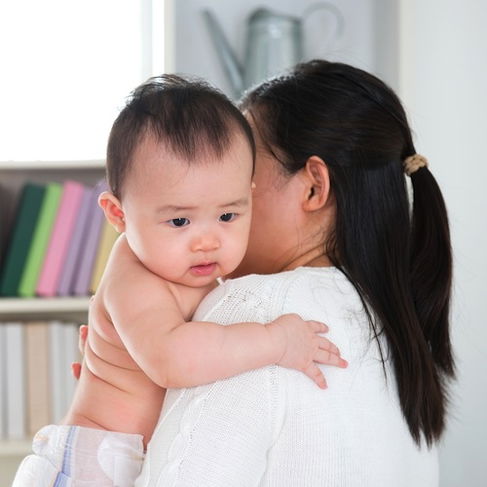Baby hiccups are common in the first year of life and often occur in infants after feeding. Hiccups can also happen in the womb,
Hiccups occur due to an involuntary contraction of the diaphragm and respiratory muscles when stimulated or irritated. Most of the time, baby hiccups are not related to a specific cause.
Typically, hiccups resolve within a few minutes without any treatment. However, you should have the baby assessed by a pediatrician if the hiccups are persistent or if they interrupt sleep or eating. The doctor will help to identify the underlying cause to initiate appropriate treatment.

How to get rid of baby hiccups
Some tips to stop baby hiccups are:
- Breastfeed the baby: this may be an option if it is time to feed the baby, as suckling can help the baby to relax and reduce the diaphragm reflex.
- Opt for an optimal feeding position: Elevate the baby's head when feeding to help air from being swallowed.
- Take burping breaks during feedings: This helps to release excess gas in the stomach.
- Allow for longer feeds: This can especially be helpful if hiccups appear after feeding, as this helps the baby to relax.
- Avoid feeding excessively: It is important to feed the baby only when they present with hunger cues. A very full stomach facilitates reflux episodes of diaphragm contractions.
- Place the baby in an upright position to burp: Maintain the baby in an upright position to burp, as this promotes the release of gas in the stomach, which can relieve hiccups;
- Keep the baby warm: The cold can also trigger hiccups, so be sure to wrap the baby and keep them warm when temperatures dip.
Most of the time, a baby's hiccups resolve within a few minutes, without the need for any specific treatment. They do not pose a risk to their health, although they can be a little uncomfortable.
When to go to the pediatrician
If the hiccups are persistent, interrupt sleep routines or if the baby presents with other symptoms like inadequate weight gain and irritability, it is important to consult a pediatrician to assess for any problems that require treatment.
Hiccups that present with symptoms like drowsiness, difficulty eating, shortness of breath and changes in skin color, the baby should be urgently assessed in an emergency room.
Possible causes
Most of the time, baby hiccups do not have a very clear cause. They typically appear during or after feeding, if the baby is breathing quickly or after swallowing a lot of air, from intense laughing or playing.
If hiccups persist for more than 2 days, they can be caused by infections, such as laryngitis or pneumonia, intestinal obstruction and changes in mineral levels.
Is hiccups in newborn babies normal?
Most of the time, hiccups in newborn babies are not a sign of a serious problem and only last for a few minutes. It is believed that hiccups are usually caused by eating, when the stomach becomes too full or fills quickly, which can stimulate the diaphragm.
Baby hiccups in the womb
A baby's hiccups can occur in the womb as a result of learning to breathe. The hiccups in the womb can be felt by the pregnant woman and may be visible during ultrasounds.






























